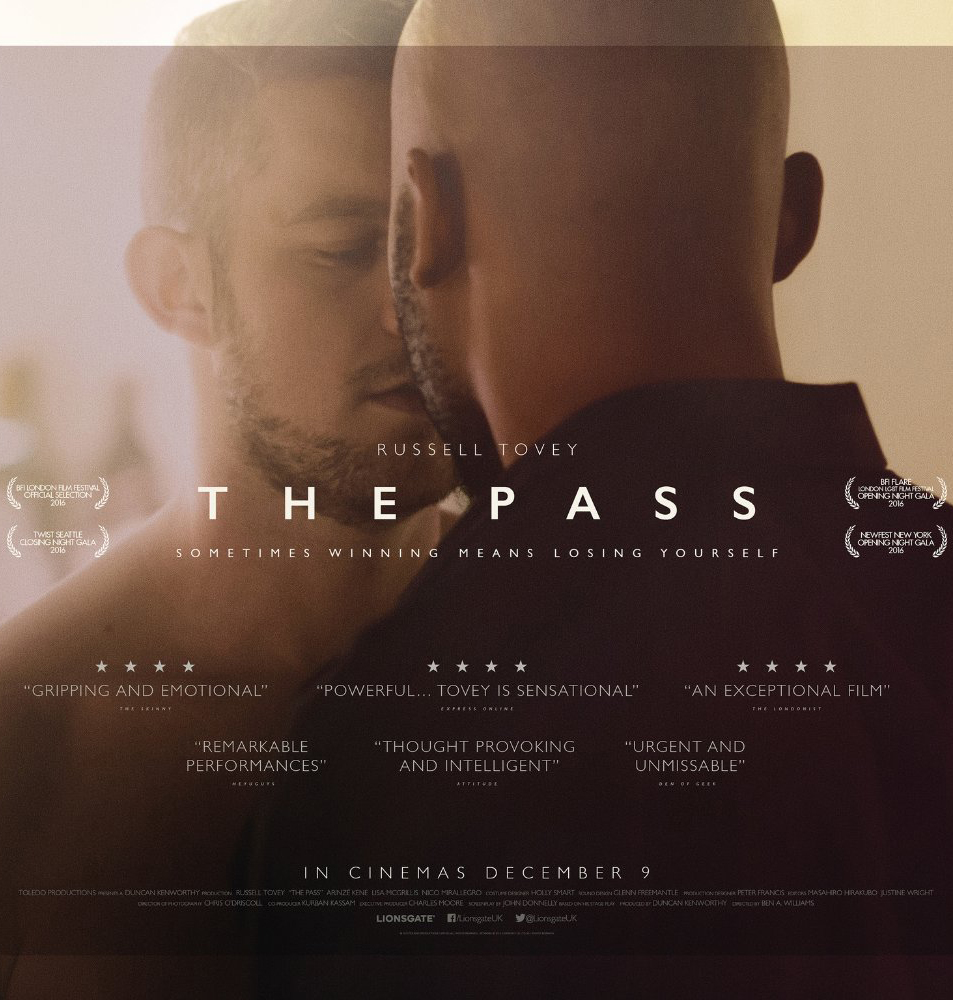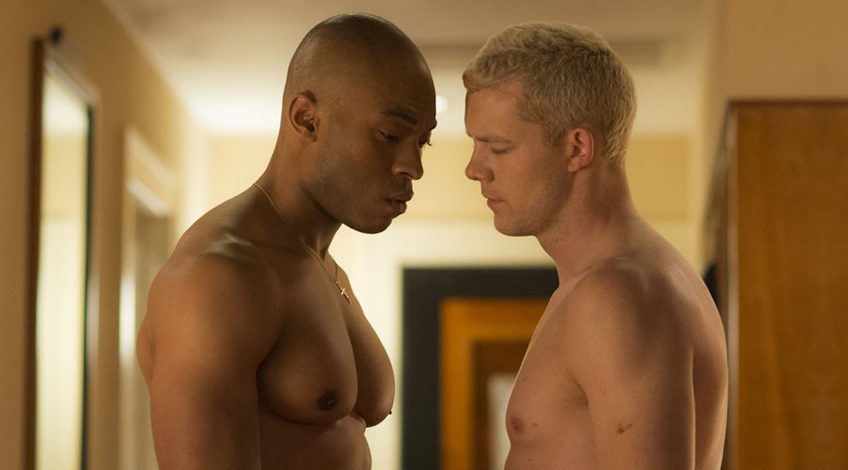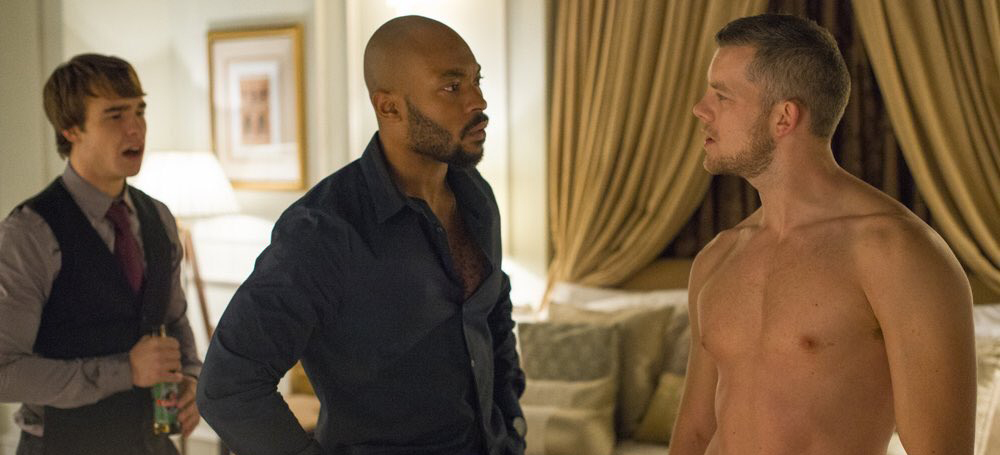Joyce Glasser reviews The Pass (December 9, 2016)
While watching The Pass, the impressive directorial debut of Ben A Williams, you can be forgiven for thinking you are watching a ‘live from the Royal Court’ transmission of John Donnelly’s play about closeted footballers, which starred Russell Tovey. The three distinct time periods, each with a different, single hotel interior location correspond perfectly to a play’s three-act structure, and that that the small cast of four project their voices and their gestures for the guy in the back row. Contrivances and meaningful lines that might appear powerful in a play are magnified on the screen. To some extent, this theatrical immediacy works in Williams’ favour. For the topicality of the subject and Russell Tovey’s stand-out performance make The Pass the hottest cinema ticket this week.
 It is 2006 and Jason (Tovey) an ambitious 17-year-old footballer is in Bucharest, Romania nervously awaiting his first big match – if he is chosen to play. He is sharing a room with his best mate from the training academy Ade (Arinze Kene). They are teammates, but they are also competitors. Ade knows that ‘they can’t keep us both.’ Donnelly, who adapted his own play for the screen, introduces not only class but race and even religion into the sexual cauldron with the fair, pale skinned Jason dressed only in tight white briefs, and Ade, a strikingly handsome black man, who tells the agnostic Jason that he should try praying sometime, in black briefs.
It is 2006 and Jason (Tovey) an ambitious 17-year-old footballer is in Bucharest, Romania nervously awaiting his first big match – if he is chosen to play. He is sharing a room with his best mate from the training academy Ade (Arinze Kene). They are teammates, but they are also competitors. Ade knows that ‘they can’t keep us both.’ Donnelly, who adapted his own play for the screen, introduces not only class but race and even religion into the sexual cauldron with the fair, pale skinned Jason dressed only in tight white briefs, and Ade, a strikingly handsome black man, who tells the agnostic Jason that he should try praying sometime, in black briefs.
When Jason’s asks Ade, ‘If I have a better position than you, will you pass me the ball?’ it’s one of several lines that have a ‘this will be significant’ impact on screen. Cooped up in the room and too excited to sleep, the men fool around physically, with Jason sending signals that Ade cannot read, perhaps because Jason cannot understand them. Their horseplay leads to a kiss that startles them both. The title becomes a pun, tying the macho world of football to a tender, sexual encounter.
A caption tells us that it is London, five years later. Jason is now a successful, wealthy, celebrity, but there’s unexplained blood on his shirt and a predatory woman (Lisa McGrillis, excellent) he barely knows in his bathroom. Jason tells her that he owes his success to his first game in Romania where he took a chance while he had it. Instead of passing the ball to his teammate in a better position, he scored ‘the goal of the century.’ A game is being played in this hotel suite, too, and we – and the two players – are never sure who the victim is. The woman clearly has an agenda that Jason seems aware of, but she assures him that she is ‘not that kind of person.’ ‘Well, I guess you are’, he points out. But what kind of person is Jason, who also has an agenda? His wife is seeking custody of their two kids and Jason needs to ensure that his virility is not called into question and publicised.
A caption tells us that it is five years later in Manchester. Jason is alone in a hotel room, popping prescription pills – he had a knee operation – and drinking, when a visitor knocks on the door. It’s Ade whom he hasn’t seen since Romania. They quickly play catch up with Jason mentioning his kids – and a five match ban. He turns cold for a second when Ade, who is now a self-employed plumber, tells him he is not married, but living with someone named Gary.
As though on cue, Jason challenges Ade to a manly competition on the stationary bike and then suggests they have a laddish laugh, throwing the TV out the window. Ade goes along with it, eager to get to the truth about Bucharest, but aware that Jason is still playing a game. When a cute bellhop arrives to deliver a screwdriver, Jason embarks on a nasty, puerile game with the star-struck young man. It seems designed to push Ade away just when Jason is dying of loneliness.
Because Williams rightly refuses to expand the play, the hotel room encounters are all the more claustrophobic, as though Jason is being pushed to breaking point. And we want him to break, but his denial and fear are too strong. This is the tension in the film and, with the exception of the brief moments when the woman and the bellhop are onto Jason’s homosexuality, the pressure is all internalised.
If the two actors never look 17 (Tovey is 35) and they do not age, Williams ensures that we feel the passage of time. Tovey and Kene are transformed from excited boys for whom everything is possible to men with regrets and unfulfilled potential.
Tovey, who viewers might recognise from the films Tower Block, Pride and The History Boys, or a variety of television drama and comedy series, is gay, but this does not come across in the film. In fact, he is at his most natural in the scene with the woman-for-hire. Tovey starred at the Royal Court in 2014, and has mastered the very different rhythms and tones of each scene, though they all feel fresh and raw.
Viewers who caught Moonlight at the London Film Festival, a film that, in structure and story bears an uncanny resemblance to The Pass, might miss that movie’s subtlety, the more natural dialogue and its poetry. Though they are very different works, it sometimes seems that Donnelly, not content with the subject of homosexuality in football, is introducing more issues than the film can explore.
Is there a reason why the more dominant, aggressive and financially successful man is white, and the man who ends up happy in a relationship, but, a plumber is black? Is this related to the financial status of their respective fathers (discussed in the first scene)? The theme of celebrity, that is necessary for the second scene to work, muddies the water a bit in the third scene. Is this still why Jason is keen to keep up appearances? Here, Jason might remind you of Howard Hughes, a drugged recluse who is exhibiting strange behaviour. But after his arrogant display of cruelty to both the hotel boy and Ade, it becomes more difficult to empathise.
You can watch the film trailer here:





